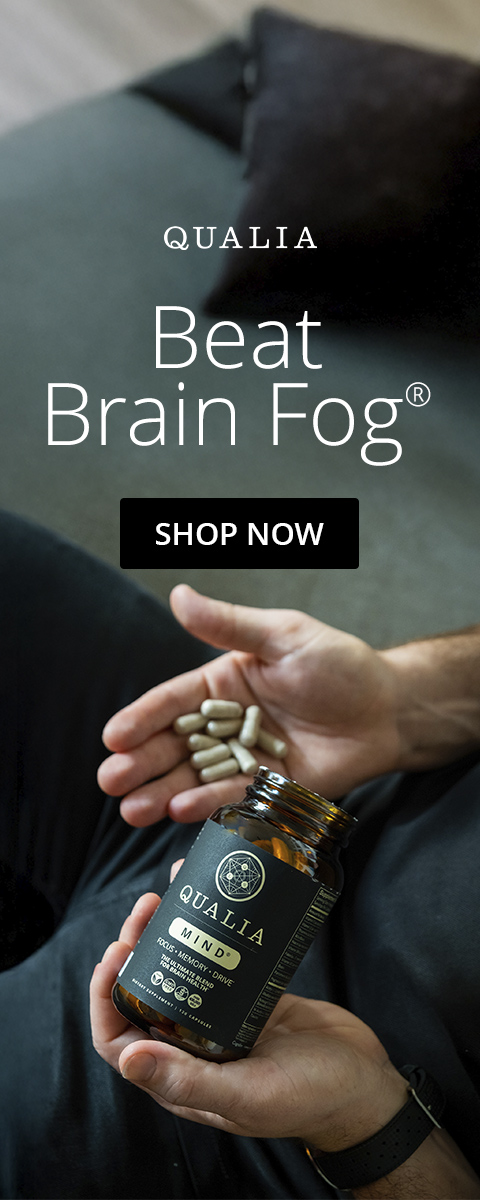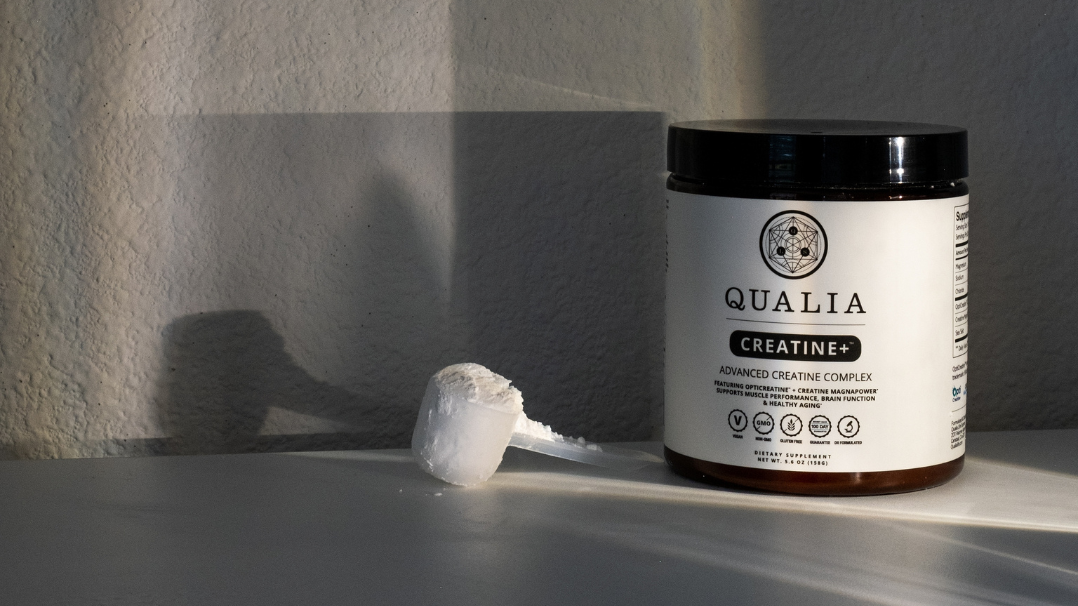The science of stress is more complex than ever before. New studies shed light on the fact that while emotional stressors are definitely part of the equation, “stress” must be viewed holistically in order to attain true well-being.
Lack of sleep, the gut-mood connection, daily exposure to toxins, and even our stress mindsets are all components that tax our body, putting our health, longevity, and mental wellness at risk.
The good news is, there are easy to implement techniques to hack your body’s biology in order to feel your best. Here are a few of our favorite biohacks for stress free living.
5 Science-Backed Biohacks For Managing Stress
Breathwork
Deep and rhythmic breathing helps you calm your thoughts, slow your heart rate, and regulate your autonomic nervous system. The Qualia team believes in the power of breathwork so much that we devoted an entire month to breathwork strategies to help you harness the power of your breath.
One approach is to slow your breathing pace to 6 breaths a minute for a few minutes anytime you feel stressed. This means breathing in for 5 seconds and breathing out for 5 seconds for about 5 minutes. This is called "Paced Breathing." A variation that also includes holding the breath between inhalations and exhalations is box breathing. Learn more, here.
Yoga
Yoga Nidra, also known as yogic sleep, is a pratyahara (withdrawal of senses) technique whose goal is to induce a state of complete physical, mental, and emotional relaxation that can be described as “sleeping consciously”—a sleep-like state in which you remain aware. Yoga Nidra practice is used as a technique for stress management and sleep promotion and has been shown to support sleep in poor sleepers.
Nature Sounds
Sounds from nature could in fact be helpful for memory and mood as they might be unconsciously associated with a safe and vital environment. As a typical example of a natural soundscape, links have been made between birdsongs and better mental wellness and better cognitive performance. In this regard, one factor perceived as important for benefits on well-being and life satisfaction is having a higher diversity of bird species.
Movement
Physical activity rewires your brain. Exercise and physical activity, in general, are essential parts of a healthy lifestyle. It’s well-documented that aerobic exercise is beneficial for pretty much every system in the human body. Exercise improves cardiovascular and metabolic health, immune signaling, endocrine signaling, mitochondrial function, cell energy production, and rewires your stress response, all of which support healthy brain function either directly or indirectly.
Adpaptogens
Adaptogens are plants that help us adapt to and recover from stress. Taking an adaptogen might give you the extra strength and stamina needed to deal with the stress better and avoid getting sick or run down. Excellent adaptogens include ashwagandha, Black Ginger, Golden Root or Rhodiola, and Southern Ginseng.
Qualia Mind and Qualia Mitochondria both include adaptogens and other nutrients that support healthier stress responses. Add one or both to your daily routine.
Gratitude
Studies show that positive emotions – such as awe and gratitude can have strong health benefits like reducing chronic inflammation and decreasing harmful levels of stress hormones.
An excellent way to cultivate a grateful spirit is to start each day by writing down three things we are grateful for. Not only are you combining the benefits of journaling with the active adoption of a more positive mindset, but you are also left with a vault of memories that can be reread to ground you when life feels overwhelming.
Books to Help You Shift Your Stress Mindset
The research on stress mindsets shows that viewing stress as a helpful part of life, rather than as harmful, is associated with better health, emotional well-being and productivity at work – even during periods of high stress. If you’re looking to shift you stress mindset check out these two great neurohacking reads:
- Unbeatable Mind. Collective Insights podcast guest Mark Divine is an expert in the field of mental toughness. His book, Unbeatable Mind, helps you strengthen your thinking and mental-state with self-development with tools and techniques not easily found anywhere else. Achieve your maximum potential in any career, business or just in life through Mark’s integrated plan of warrior development.
- The Upside Of Stress. Kelly shows readers how to cultivate a mindset that embraces stress, and activate the brain's natural ability to learn from challenging experiences. Both practical and life-changing, The Upside of Stress is not a guide to getting rid of stress, but a toolkit for getting better at it—by understanding, accepting, and leveraging it to your advantage.
A Game-changing Discussion: The Neuroscience of Stress - Strategies to Relax The Mind
We experience a stress response when we feel a threat, whether the threat is real or perceived. Teaching our bodies to respond appropriately to stressors is key in maintaining wellness. Recently, Dr. David Rabin joined us to discuss forward-thinking approaches to train the mind to turn on the parasympathetic nervous system and relieve chronic stress.
We discussed everything from training heart rate variability for increased resilience to the role of psychedelic assisted therapy. Listen in now.
Take the Next Step Toward Healthy Aging
Qualia longevity supplements like Qualia Senolytic and Qualia NAD+ are Redefining Human LongevityTM.
Aging is a natural process, but science is charging ahead with new ways to optimize both our healthspan and lifespan. Senolytics offer an exciting opportunity to support cellular health and maintain vitality as you age.* Go ahead and try Qualia Senolytic with our 100-day money-back guarantee: if you do not love Qualia for any reason, simply get in touch via phone or email and let us know you’d like a refund. Your older self will thank you.
*These statements have not been evaluated by the Food and Drug Administration. This product is not intended to diagnose, treat, cure, or prevent any disease.
‡Based on double-blind placebo-controlled studies. Individual results may vary. Full study details at https://www.qualialife.com/studies/qualia-senolytic-placebo-controlled-clinical-study-results









No Comments Yet
Sign in or Register to Comment